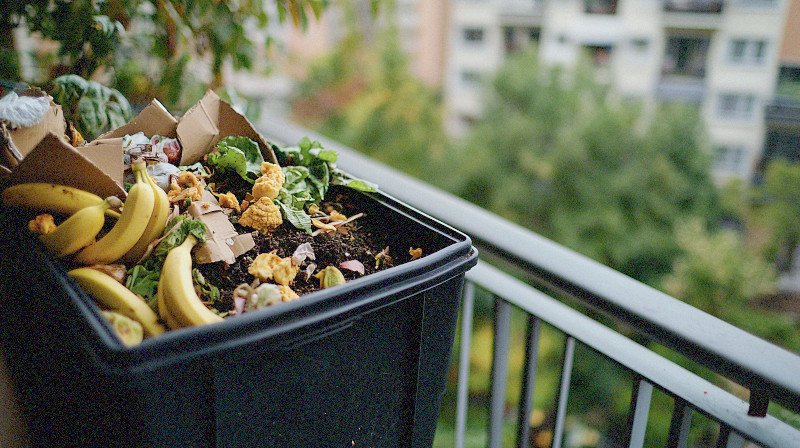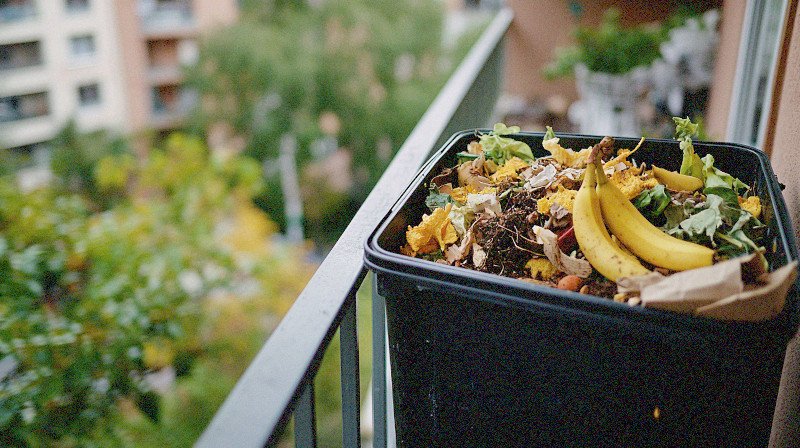Living in a city doesn’t mean you have to throw food scraps in the trash. With a little planning, you can turn your balcony into a composting powerhouse — no yard required.
I’ve done this myself, and I can promise: it’s not as complicated (or smelly) as it might sound.
What Is Balcony Composting and Why Should You Start?
Balcony composting is a method of converting food and plant waste into nutrient-rich compost in small urban spaces. It’s ideal for apartment dwellers who want to reduce their trash footprint and enrich their container gardens.
By composting on your balcony, you’re reducing methane-emitting landfill waste, lowering your household’s carbon output, and creating a free, organic fertilizer for your potted vegetables or small-space garden.
What Type of Compost Bin Works Best for a Balcony?
The best compost bin for a balcony is compact, sealed, and ventilated — like a bokashi bucket, worm bin, or stackable tumbler. These are ideal for tight quarters and help manage odors and pests.
- Sealed bins reduce smells and leakage.
- Worm composters (vermicomposting) thrive in apartments and produce rich castings.
- Bokashi bins ferment food waste anaerobically, perfect for meat and dairy scraps.
How to Set Up a Compost Bin on Your Balcony Step-by-Step
To set up a balcony compost bin, choose a contained bin, layer greens and browns, and ensure aeration. Maintain moisture and keep it out of direct rain.
Where Should You Place Your Compost Bin on a Balcony?
Choose a shaded, well-ventilated corner — ideally sheltered from rain and direct sun. Keep it off the ground if possible, especially in wet weather.
What Materials Can Be Composted in a Balcony Bin?
Compostable materials include fruit and veggie scraps, coffee grounds, tea leaves, shredded newspaper, cardboard, dead leaves, and indoor plant trimmings.
What Not to Put in a Balcony Compost Bin
Avoid dairy, meat, bones, oily foods, and pet waste — these items attract pests and cause odor issues in small-space bins.
How to Maintain Proper Green-Brown Ratio?
A good compost mix is about 2 parts brown (dry carbon-rich material) to 1 part green (wet nitrogen-rich scraps). For example, balance coffee grounds with shredded paper or cardboard.

How to Manage Odor and Pests in a Small Composting Space
To keep your compost bin fresh and pest-free, ensure proper layering, cover food scraps with browns, and stir the contents weekly.
- Use a tightly sealed lid with ventilation holes.
- Layer wet scraps beneath dry matter immediately.
- Add a few citrus peels — they naturally repel bugs.
How Long Does It Take to Get Usable Compost?
On a balcony, composting typically takes 6–12 weeks depending on temperature, materials, and how often you turn the pile. Worm bins may yield faster results.
How to Use Compost from a Balcony Bin?
Use finished compost to enrich potted plants, make your own potting mix, or spread it around your indoor plants. It can also be added to hanging herb gardens or shared with neighbors.
Common Mistakes in Balcony Composting and How to Fix Them
- Too wet? Add more browns (cardboard, shredded paper).
- Too dry? Add greens (veggie scraps) or mist lightly.
- Smelly? Mix contents more often and avoid citrus overload.
- Pests? Cover all food scraps well and clean the container lid regularly.
Tools and Accessories to Optimize Your Balcony Composting
Handy tools include a small trowel, moisture meter, compost thermometer, and an odor-control lid. You might also appreciate a mini sifter for mature compost.
Can You Compost in Winter on a Balcony?
Yes, but it slows down. Insulate the bin using cardboard or straw and keep it out of freezing wind. Bokashi composting is especially effective year-round.
How Does Balcony Composting Help the Environment?
Balcony composting diverts food waste from landfills, reduces methane emissions, and promotes soil health. Even in small quantities, it contributes to a larger circular ecosystem.
FAQs About Balcony Composting
- Can I compost cooked food on my balcony?
- It’s not recommended in traditional composting. Use a bokashi bin if needed.
- What if I don’t have enough brown materials?
- Use shredded cardboard boxes or dry leaves. Avoid glossy paper or plastics.
- Is it safe to compost during summer heat?
- Yes — just add browns and keep the bin out of direct sun.
Final Tips to Make Balcony Composting a Success
- Turn the compost weekly to speed up decomposition.
- Label your bin clearly if you share the space with neighbors.
- Combine composting with small space gardening to complete the cycle.
- Stick to one composting method at a time until you’re confident.
I'm George Brown, a passionate gardener and the founder of UrbanLeafy.com. I love helping beginners grow fresh herbs, plants and greenery, whether on a windowsill, in a garden or a tiny balcony. My practical, no-fluff tips have been featured in Homes & Gardens, Livingetc, and Best Life, and are rooted in years of real experience. If you're ready to turn your space into a thriving herb haven, you’re in the right place.



